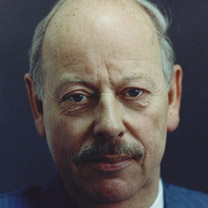Pieter Kooijmans
Peter Kooijmans | |
|---|---|
 | |
| Judge of the International Court of Justice | |
| In office 1 March 1997 – 1 March 2006 | |
| Preceded by | Luigi Ferrari Bravo |
| Succeeded by | Kenneth Keith |
| Minister of Foreign Affairs | |
| In office 2 January 1993 – 22 August 1994 | |
| Prime Minister | Ruud Lubbers |
| Preceded by | Hans van den Broek |
| Succeeded by | Hans van Mierlo |
| State Secretary for Foreign Affairs | |
| In office 11 May 1973 – 19 December 1977 | |
| Prime Minister | Joop den Uyl |
| Preceded by | Tjerk Westerterp |
| Succeeded by | Durk van der Mei |
| Personal details | |
| Born | Pieter Hendrik Kooijmans 6 July 1933 Heemstede, Netherlands |
| Died | 13 February 2013 (aged 79) |
| Political party | ARP (1973-1980) CDA (from 1980) |
| Children | 4 children |
| Residence(s) | Wassenaar, Netherlands |
| Alma mater | Vrije Universiteit |
| Occupation | Jurist, Diplomat |
Pieter Hendrik "Peter" Kooijmans (Dutch pronunciation: [ˈpitər ˈɦɛndrɪk ˈpeːtər ˈkoːimɑns]; 6 July 1933 – 13 February 2013) was a Dutch jurist, politician and diplomat. He was a member of the Anti Revolutionary Party and later a member of its successor party the Christian Democratic Appeal. He was State Secretary and later Minister of Foreign Affairs (1973–1977 and 1993–1994). In between these periods of office he worked for the UN as the United Nations Special Rapporteur on Torture,[1] (1985–1993). He served as a Judge on the International Court of Justice (1997–2006).
Early life and education
Pieter Hendrik Kooijmans was born on 6 July 1933 in Heemstede in the Netherlands. His father was Johannes Kooijmans, an engineer and a member of the city council of Heemstede, and his mother was Alida Jonker.[2]
Kooijmans went to the secondary school Eerste Christelijk Lyceum in Haarlem, where he followed the gymnasium program in humanities. In 1951, he started his studies economics and Dutch law at the Free University in Amsterdam. He received his candidate degree in economics (Bachelor of Economics) in 1955 and his master's degree in law (Master of Law) cum laude in 1957. He obtained his doctorate in constitutional law (Doctor of Law) with his dissertation The doctrine of the legal equality of states; an inquiry into the foundations of international law at the Free University in 1964.[2]
Academic and political career
Following graduation, he joined the University's faculty as Professor of Public International Law and European Law, serving from 1965 to 1973.
He joined the Dutch Foreign Ministry, as State Secretary for Foreign Affairs from 1973 to 1977. In 1976 and again in 1991, he served as a Lecturer at the Hague Academy of International Law. From 1978 to 1992, he served as a Professor of Public International Law at the University of Leiden. From 1993 to 1994, he served as Foreign Minister of the Netherlands, succeeding Hans van den Broek. In 1995, he returned to his former position as Professor of Public International Law at the University of Leiden, serving until his appointment to the International Court of Justice.
On 13 July 2007, Kooijmans was appointed as Minister of State by the Cabinet of the Netherlands, and served in that post until his death at the age of 79 of undisclosed causes on 13 February 2013.[3]
On 5 February 2014, Kooijmans' alma mater, the Vrije Universiteit started the Kooijmans institute.[4]
Orders and honorary titles
- Knight of the Order of the Netherlands Lion (1978)[2]
- Commander of the Order of Orange-Nassau (1994)[2]
- Knight of the Order of the Gold Lion of the House of Nassau (2006)[2]
- Minister of State (2007)[2]
- The Pieter Kooijmans Chair for Peace, Law and Security is a rotating academic chair created in 2009 at Leiden University,[5]
References
- ^ "Special Rapporteur on torture and other cruel, inhuman or degrading treatment or punishment". Office of the United Nations High Commissioner for Human Rights. Retrieved 2010-11-06.
- ^ a b c d e f "Dr. P.H. (Peter) Kooijmans". Parlement & Politiek (in Dutch). Leiden University. Retrieved 15 April 2015.
{{cite web}}: Italic or bold markup not allowed in:|work=(help) - ^ "Oud-minister Kooijmans overleden". Retrieved 2013-02-13.
- ^ "Faculteit start onderzoeksinstituut recht en maatschappij". Retrieved 2014-02-06.
- ^ "Former Secretary-General of NATO to be appointed professor". Leiden University. 1 September 2009.
External links
- Kooijmans Institute at the Vrije Universiteit - Official homepage (Dutch)
- 1933 births
- 2013 deaths
- People from Heemstede
- People from Wassenaar
- International Court of Justice judges
- Ministers of Foreign Affairs of the Netherlands
- Ministers of State (Netherlands)
- Anti-Revolutionary Party politicians
- Christian Democratic Appeal politicians
- Dutch academic researchers
- Dutch diplomats
- Dutch jurists
- Dutch legal scholars
- International law scholars
- VU University Amsterdam faculty
- Leiden University faculty
- Hague Academy of International Law people
- United Nations Special Rapporteurs on torture
- Knights of the Order of the Netherlands Lion
- Knights of the Order of the Gold Lion of the House of Nassau
- Commanders of the Order of Orange-Nassau
- Protestant Church Christians from the Netherlands
- Grand Crosses of the Order of Merit of the Federal Republic of Germany

